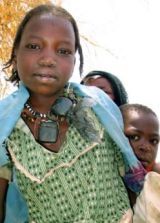Darfur returnees still fear attack
By Opheera McDoom
SANIA DELAIBA, Sudan, June 23 (Reuters) – Darfur refugees who returned to a village cited by Khartoum as a model of security say they are virtual prisoners, fearing renewed attack by Arab militias if they venture out.

|
|
Sudanese girl adorned with ‘hijab’ talisman ornaments on her neck, worn by many tribes which they believe can save them from bad luck, poses as her sibling peers from behind, at the Abu Sroug Camp about 100 km (62 miles) north of Al Geneina along the border between Sudan and Chad, west Darfur, April 21, 2005. (Reuters). |
The inhabitants of Sania Delaiba in South Darfur state fled fighting and had their homes burnt last May during a revolt by mostly non-Arab rebels which has run into its third year in Sudan’s remote western Darfur region.
They returned home a few months later and were compensated by the Khartoum government, but say they feel trapped in their small village of about 2,000 inhabitants south of the state capital Nyala.
Although major conflict has stopped in the past few months in Darfur, armed attacks are still widespread.
“We didn’t come home just to sit here in our village and do nothing — we want to go out and farm,” said Salih Eissa Abakr, a religious leader in the village.
“We are scared of this area outside the village — there are Arab camel and cattle herders who attack us,” he said. He added only a few days ago a group of armed Arab tribesmen had attacked and shot at them when they ventured out about 7 km (4 miles).
Tens of thousands have been killed and 2 million were driven from their homes during the uprising by the insurgents, who accuse the Khartoum government of neglect and of giving Arab tribes preferential treatment.
Khartoum bombed civilian villages it says rebels were using as human shields and the United Nations says it armed Arab militias accused of widespread rape, killing and looting.
The government says tens of thousands of people have returned and insists the villages are safe, citing Sania Delaiba as the perfect example. But international aid workers and the residents of Sania Delaiba disagree.
People thanked the government for bringing police into the village, which they said was very safe, but said police never ventured more than a couple of kilometres (a mile) away.
“There’s no woman who goes outside, not even the men want to go out of the village,” said Halima Abdellahi Ahmed.
The lack of safety in their villages for those who have returned makes facilitating voluntary returns for the almost 2 million in camps in Darfur a difficult task.
In Kass town east of Nyala, where refugees outnumber residents more than three to one, resources have been exhausted and the economy strangled by the pressure of hosting them.
The refugees refuse to leave the town’s school where they are encamped, even for other houses within the town which the government has provided for them.
“We are not even going to talk to you about moving anywhere else — you just want us to go out into the wilderness and be killed?” one man shouted at a joint government-U.N. and donor country delegation visiting on Thursday. A similar message is heard in many other camps in Darfur.
